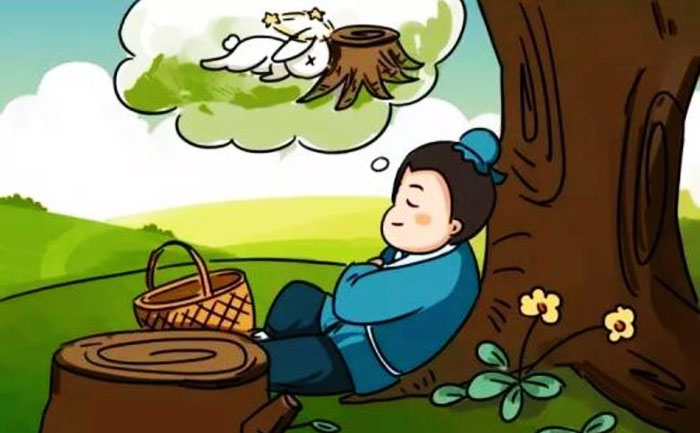The story behind the Chinese idiom, complete with the sentence examples for you to learn.
Simplified Chinese
从前,有一个农夫。
有一天,他在种田的时候,突然有一只兔子跑过来。这只兔子跑来跑去,不小心撞到树桩。兔子死了。
农夫把死兔子拿回家,把兔子做成一盘菜。
农夫吃了兔子以后,想:“我不需要努力工作了,我只要每天等撞死的兔子就好了。”
所以,他不再种田了。他每天在树桩旁边等着兔子撞死。
但是,他等了一个月,没有看见兔子撞到树桩。
最后,因为农夫没有种田,也没有找到兔子,他就饿死了。
现在,人们用“守株待兔”这个成语来形容“不主动努力,希望收到意外的收获。”
怎么用“守株待兔”这个成语呢?我们看以下的两个例句吧:
- 只想守株待兔的人,是不会成功的。
- 如果你要赚钱,就要工作,不要打赌。打赌只是守株待兔。
Traditional Chinese
從前,有一個農夫。
有一天,他在種田的時候,突然有一隻兔子跑過來。這隻兔子跑來跑去,不小心撞到樹樁。兔子死了。
農夫把死兔子拿回家,把兔子做成一盤菜。
農夫吃了兔子以後,想:「我不需要努力工作了,我只要每天等撞死的兔子就好了。」
所以,他不再種田了。他每天在樹樁旁邊等著兔子撞死。
但是,他等了一個月,沒有看見兔子撞到樹樁。
最後,因為農夫沒有種田,也沒有找到兔子,他就餓死了。
現在,人們用「守株待兔」這個成語來形容「不主動努力,希望收到意外的收穫。」
怎麼用「守株待兔」這個成語呢?我們看以下的兩個例句吧:
- 只想守株待兔的人,是不會成功的。
- 如果你要賺錢,就要工作,不要打賭。打賭只是守株待兔。
English Translation
Once upon a time, there was a farmer.
One day, when he was farming, a rabbit suddenly ran past him. This rabbit ran back and forth, and accidentally knocked against a tree stump. The rabbit died.
The farmer brought the dead rabbit home and made a dish out of the rabbit.
After the farmer had eaten the rabbit, he thought: “I don’t have to work hard, every day, I will just wait for a rabbit to die from bumping against something and that’s it.”
So he didn’t farm anymore. Every day, he waited next to the tree stump for a rabbit to knock against it and die.
However, he waited a month and didn’t see any rabbit bump against the tree stump.
In the end, since the farmer hadn’t been farming, and also hadn’t found a rabbit, he died from hunger.
Now, people use the idiom “Shou Zhu Dai Tu (guarding a tree stump, waiting for rabbits)” to describe “to not be active and working hard, hoping to receive an unexpected reward”.
How to use the idiom “Shou Zhu Dai Tu”? Let’s look at the following two example sentences:
- People who are only “guarding a tree stump, waiting for rabbits” cannot succeed.
- If you want to earn money, you need to work, not gamble. Gambling is just “guarding a tree stump, waiting for rabbits”.
Indonesia Translation
Dahulu kala, ada seorang petani.
Suatu hari, ketika dia sedang bertani, seekor kelinci tiba-tiba berlari mendatanginya. Kelinci ini berlari kesana kemari, dan secara tidak sengaja menabrak tunggul pohon. Kelinci itu pun mati.
Sang petani membawa pulang kelinci yang mati itu dan memasaknya menjadi sepiring makanan.
Setelah petani memakan kelinci itu, dia berpikir: “Aku tidak perlu bekerja keras lagi setiap hari, aku hanya perlu menunggu kelinci yang mati karena menabrak sesuatu setiap hari.”
Jadi, dia tidak bertani lagi. Setiap hari, dia menunggu di sebelah tunggul pohon, menunggu adanya kelinci lain yang menabrak [sesuatu] dan mati.
Namun, dia telah menunggu sebulan dan tidak mendapatkan kelinci [lain] yang mati menabrak tunggul pohon.
Pada akhirnya, karena sang petani tidak bertani lagi, dan juga tidak mendapatkan kelinci [lagi], ia pun mati kelaparan.
Sekarang, orang-orang menggunakan idiom “Shou Zhu Dai Tu (menjaga tunggul pohon dan menunggu kelinci)” untuk menggambarkan “tidak aktif bekerja keras, dan berharap untuk mandapatkan hadiah yang tidak terduga”.
Bagaimana cara menggunakan idiom “Shou Zhu Dai Tu”? Mari kita lihat dua contoh kalimat berikut:
- Orang yang hanya “menjaga tunggul pohon dan menunggu kelinci” tidak akan berhasil.
- Jika kamu ingin mendapatkan uang, maka bekerjalah, bukannya berjudi. Berjudi hanyalah “menjaga tunggul pohon dan menunggu kelinci”.
Photo source here.

